After years of neoliberalism, French politics that venture outside the conformist center’s unshakable loyalty to the Atlantic Alliance are now dangerously “extreme.”

Élysée Palace. (ScareCriterion12, CC BY-SA 4.0, Wikimedia Commons)
By Diana Johnstone
in Paris
Special to Consortium News
 On Sunday, Emmanuel Macron was re-elected for a second five-year term as president of the French Republic with 58.54 percent of the vote. Just as in 2017, the candidate he defeated was Marine Le Pen, who got 41.46 percent. Sounds like déjà vu all over again.
On Sunday, Emmanuel Macron was re-elected for a second five-year term as president of the French Republic with 58.54 percent of the vote. Just as in 2017, the candidate he defeated was Marine Le Pen, who got 41.46 percent. Sounds like déjà vu all over again.
From the outside, this can be seen either as showing that Macron is a popular president and/or that France has once against been saved from the fascist threat. Neither of these impressions is correct. Mostly, it signifies that France is stuck in There Is No Alternative (TINA) – the neoliberal replacement of political experimentation by expertise governance.
Macron is not overwhelmingly popular. In the first eliminatory round of elections held on April 10, over 72 percent of voters chose one of the 11 other candidates.
Macron Personifies the Center
About four decades ago, when neoliberalism was just beginning to dictate its economic necessities, French political choices were defined by a traditional “left-right” alternance in government, between the Socialist Party and the nominally (but not really) “Gaullist” conservatives, later renamed The Republicans. But this alternance lost its edge because whichever party was in office, regardless of its campaign promises, it carried out the same neoliberal policies favoring profits over wages and public services.
Five years ago, with the left-right distinction blurred by such conformity, the time was right to create a movement which was neither left nor right, or perhaps both, but was in perfect conformity with the neoliberal policies of the European Union.
The handsome young banker Emmanuel Macron was initiated into government policy-making by highly influential individuals such as Jacques Attali, the economic and social theorist, and won support from international finance for this winning project. The 39-year-old’s personal aura of vigorous youth in a hurry to get things done attracted political amateurs to support his movement “En Marche” (Let’s go). That personification won him the 2017 election.
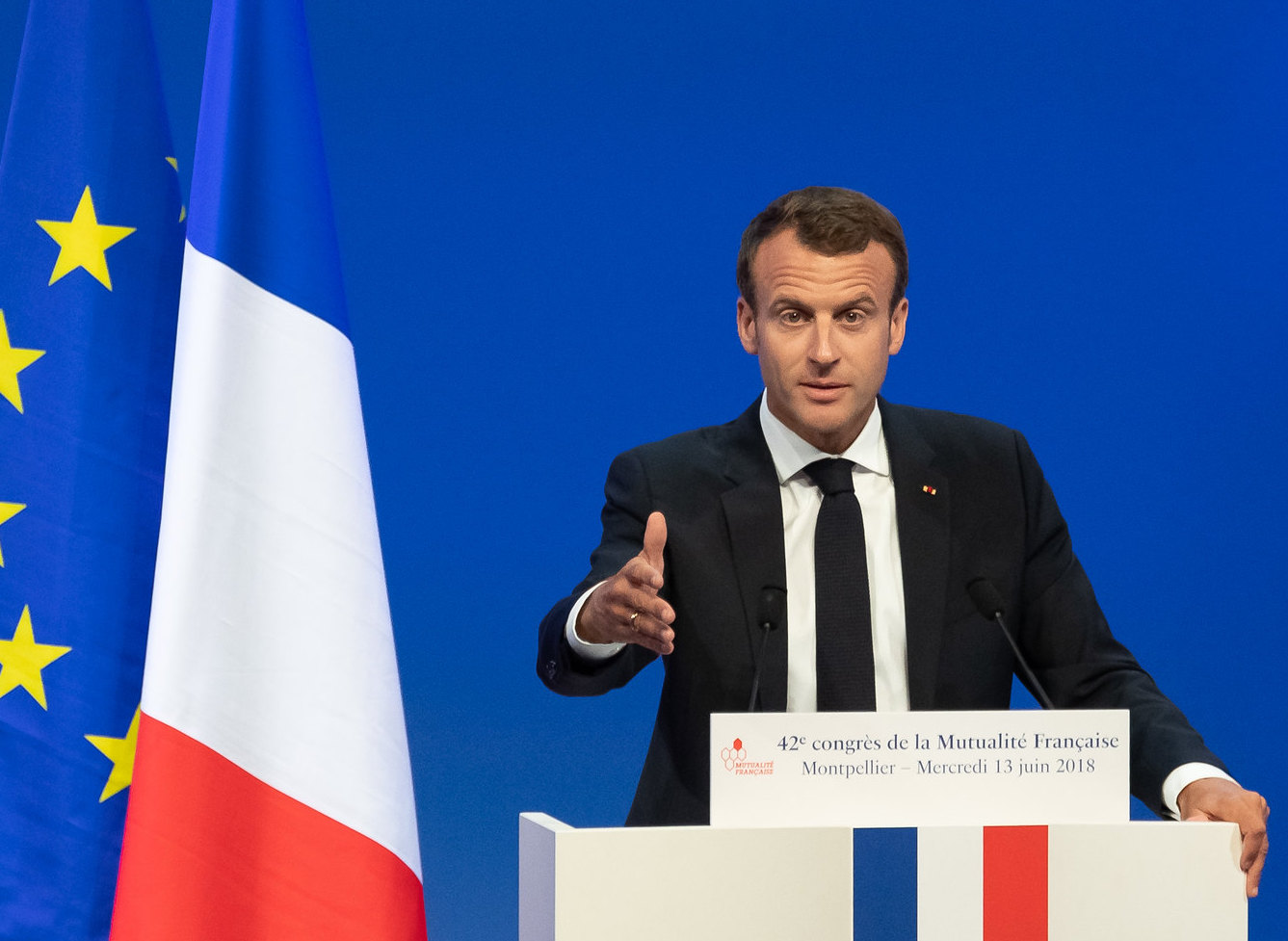
French President Emmanuel Macron in 2018. (Mutualité Française, Flickr, (CC BY-NC-ND 2.0)
What Macron was accelerating were in fact the neoliberal reforms promoted by the EU. His policies facilitated privatization and deindustrialization, as well as cutbacks in public services such as hospitals and transport. This has caused most hardships in rural France, leading to the Yellow Vests protests, severely repressed by police.
Politics Marginalized as ‘Extremes’
Last April 10, in the first round of this year’s presidential election, the two erstwhile “government” parties, Republicans and Socialists, were nearly wiped out. The Republican candidate, Valérie Pécresse, who had started out high in the polls, came in short of the crucial 5 percent of the vote, which gives parties public funding.
The fate of the Socialist Party was just as humiliating: Anne Hidalgo, famous as mayor of Paris for her chaotic efforts to eliminate cars in favor of bicycles and scooters, scored a pathetic 1.75 percent, even less than Communist Party candidate Fabien Roussel who got 2.28 percent.
The April 10 election produced three big voting blocs, around three candidates with weak parties, uncertain programs but strong personalities each representing an attitude: Emmanuel Macron 27.83 percent, Marine Le Pen 23.15 percent, Jean-Luc Mélenchon (JLM) of La France Insoumise party, 21.95 percent.
If JLM had come in second, facing Macron, there would surely have been a fear campaign stigmatizing him as dangerously “extreme,” even “communist” and “an anti-European friend of Putin.” Instead Marine Le Pen came in second, and the fear campaign stigmatized her as “extreme right,” even “fascist” and “an anti-European friend of Putin.”
Politics outside the conformist center is dangerously “extreme.”
Mélenchon Embodies the Left
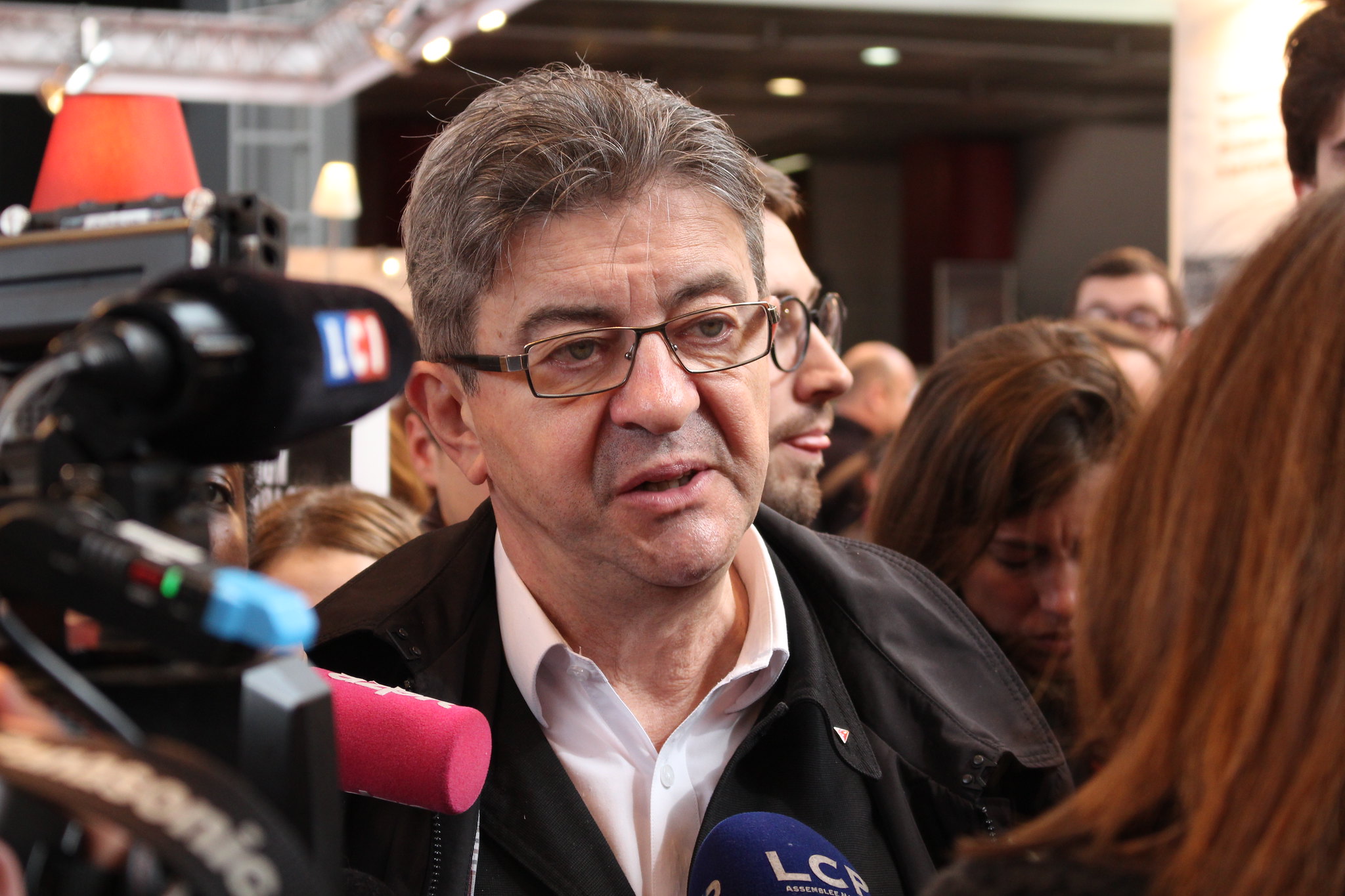
Jean-Luc Mélenchon in 2017. (ActuaLitté, CC BY-SA 2.0, Flickr)
Mélenchon’s high score was the triumph of a strong personality over parties. His fiery rhetoric gained wide public recognition when he broke with the Socialist Party during the 2005 referendum on the EU draft Constitution.
The Constitution was rejected by voters, but in defiance of the popular vote, parliamentarians went on to adopt the same measures in the Lisbon Treaty, confirming the neoliberal globalizing policies of the EU and its attachment to NATO.
In 2016 Mélenchon founded his own party La France Insoumise (Insubordinate France) whose main asset is his own vigorous oratory and cantankerous relationship with the media and adversaries. In the 2017 presidential race, he came in fourth with promises of bold policies defying EU constraints.
This time around, Mélenchon adopted a program that lacked coherence but clearly aimed at gaining votes from all sections of France’s divided and weakened left. He stressed lavishly generous measures to improve “purchasing power”: higher minimum wage, lowering retirement age to 60, price controls on basic necessities – measures that seemed unrealistic even to many on the left.
His measures to woo the green vote went all the way from all-bio free school lunches to phasing out nuclear power by 2045 – against the growing trend in France to look to France’s nuclear power industry as essential to survival.
This succeeded in leaving the Green candidate Yannick Jadot, who had dreamed of emulating the success of the bellicose German Greens, with only 4.63 percent of the vote.
For LGBTQI voters, Mélenchon spoke favorably of amending the Constitution to guarantee the right to change gender (a right that exists already). This might be seen as a bit contradictory to his efforts to gain support of the Muslim community.
Nevertheless, Muslim leaders issued a statement:
“We, imams and preachers, call on French citizens of the Muslim faith to vote in the first round for the least worst of the candidates in that presidential election: Jean-Luc Mélenchon.”
According to exit polls, Mélenchon got nearly 70 percent of Muslim votes.
This may have overlapped somewhat with his high score among youth in cities and ethnically mixed suburbs: 38 percent of voters under 25. He called for lowering the voting age to 16.
All in all, Mélenchon’s vote corresponded most clearly to the identity politics vote focused on societal rather than socio-economic issues, although he did well with the working class (27 percent of workers and 22 percent of employees) but Marine Le Pen did better (33 percent and 36 percent).
Asked why they voted for Mélenchon, about 40 percent said it was a “useful” vote — not to support his program, but rather because he was the candidate on the left who might have eliminated Marine Le Pen. He now dreams of sweeping the legislative elections in June to become the leader of the opposition — or even prime minister.
JLM’s last word to his followers on the evening of April 10 was imperative: “Not one vote for Marine Le Pen!”
Marine Le Pen, the Outsider
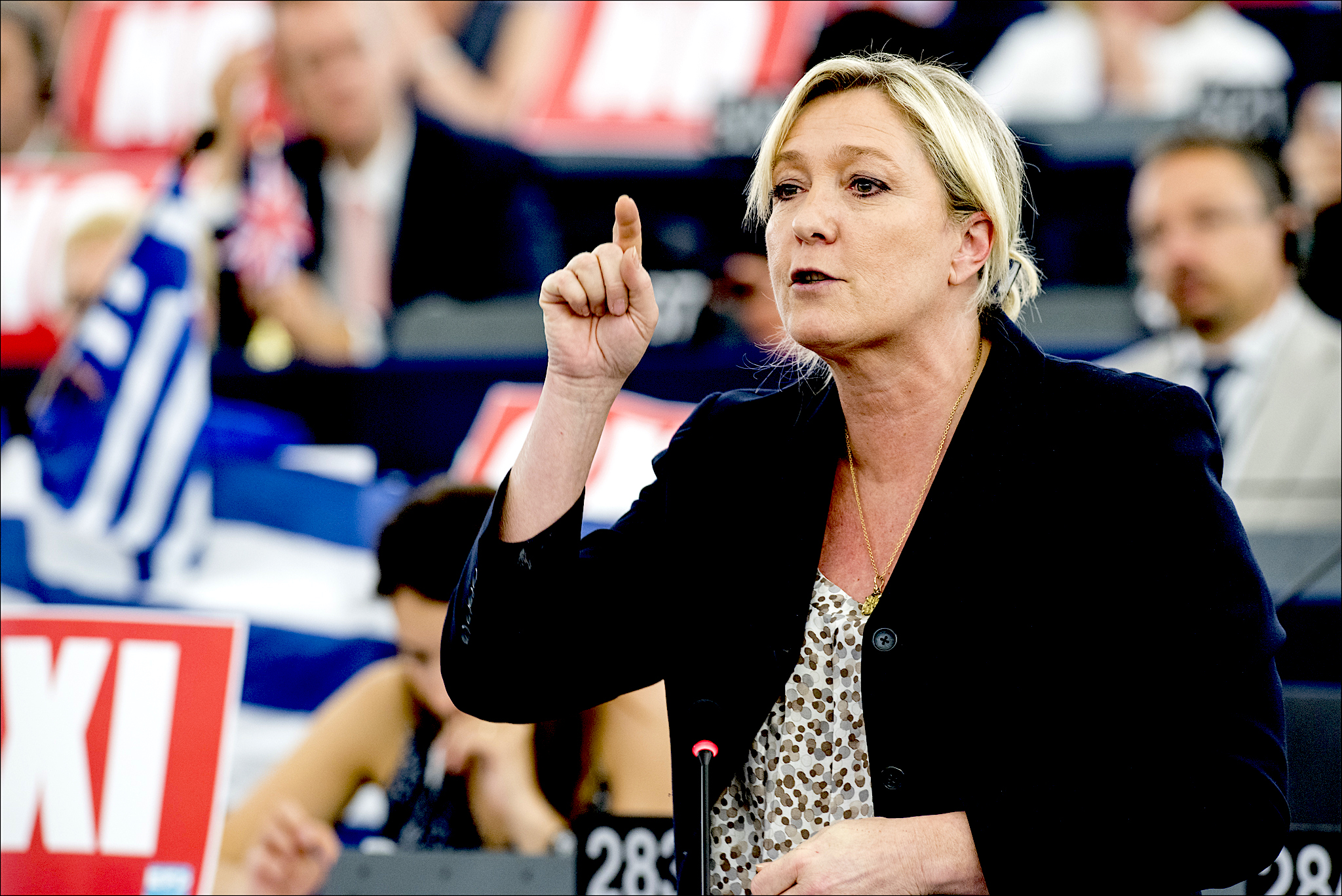
France’s Marine Le Pen in 2015, during a debate in EU Parliament. (European Parliament, Flickr, CC BY-NC-ND 2.0)
An enemy is always a unifying factor, and for the fractured French left, Marine Le Pen is the unifier. She inherited this role from her father, Jean-Marie Le Pen.
In the early 1980s, when President François Mitterrand abruptly abandoned the socializing Common Program that got him elected with strong Communist Party support, the Socialist Party switched its ideological focus to “anti-racism.”
Anti-racism gradually mutated into support for immigration and even open borders, on the grounds that any restrictions on immigration must be motivated by “racist hate.”
This was not the traditional attitude of the left. In the early 1930s, and for decades afterwards, opposition to mass immigration was a key policy of the Marxist left and the labor movement, which saw mass immigration as a technique of capital to split worker solidarity and lower wages.
Immigration evolved into a key issue only since the institutionalized left abandoned its economic program in order to go along with neoliberalism imposed by the European Union. As it happens, open borders is a position that is totally compatible with neoliberal economics, and the two can flourish together, tending toward identity politics.
In 1980, the closest the Socialists could find as racist villain was Jean-Marie Le Pen, who was opposed to large scale immigration primarily for reasons of national identity. His diverse party, the National Front, included remnants of moribund ultra-right groups, although JMLP was more facetious than fascist. His enemies blew up his remark that “Gas chambers were a detail of World War II” into proof of complicity in the Holocaust. More proactive enemies blew up his apartment, making an impression on his then 8-year-old daughter Marine.
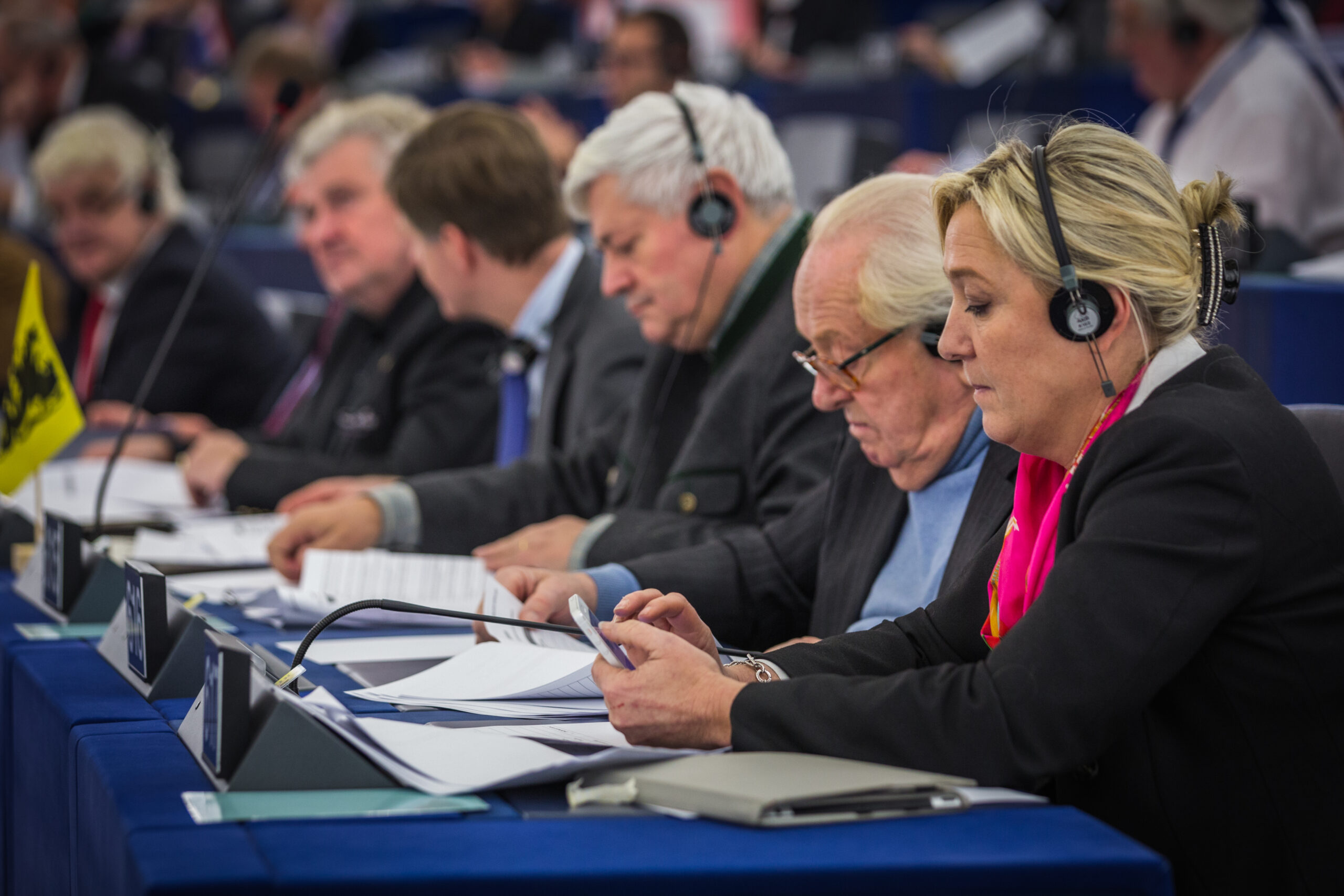
From right: Marine Le Pen and Jean-Marie Le Pen at the European Parliament in Strasbourg, Dec. 10, 2013. (Claude Truong-Ngoc, Wikimedia Commons)
Marine went on to career as a lawyer, two marriages and three children before turning to politics and virtually inheriting her father’s political party as he retired. Jean-Marie had enjoyed being provocative. Marine wanted to win hearts and minds.
She purged the most extremist elements of the party, successfully ran for parliament in the depressed northern town of Henin-Beaumont, changed the party’s name from Front National to the looser Rassemblement National and increasingly took her distance from the party itself.
She tried to be friendly to Jewish organizations. Her program called for a popular referendum on controlling immigration, which among other things would allow France to expel foreigners convicted of serious crimes. Her most controversial (and probably impossible) proposals concerned “eradicating Islamic extremist ideology” (distinguished from conventional Islam).
Jean-Marie Le Pen was fiercely anti-de Gaulle, not least because President Charles de Gaulle conceded independence to Algeria. That is ancient history to his daughter’s generation.
Marine Le Pen has increasingly identified with Gaullism: patriotism, national independence and a social conservatism that respects the interests of the working class.
She has called for France to leave the joint command of NATO, as did de Gaulle in 1966. (President Nicolas Sarkozy rejoined in 2009.). She has also advocated an independent foreign policy, normalizing relations with Russia – a point she reiterated even after the Russian invasion of Ukraine.
Meanwhile, various wars, especially the 2011 destruction of Libya, have accelerated illegal immigration.
While the brain drain —notably of medical personnel from poor countries — is always welcome, the economy is currently not able to absorb unqualified labor, which inevitably leads to social problems. The refusal of the left to acknowledge the existence of such problems makes it extremely difficult to raise the issue without being labeled “racist.” But the questions raised are there.
Zemmour, the Surprise Candidate
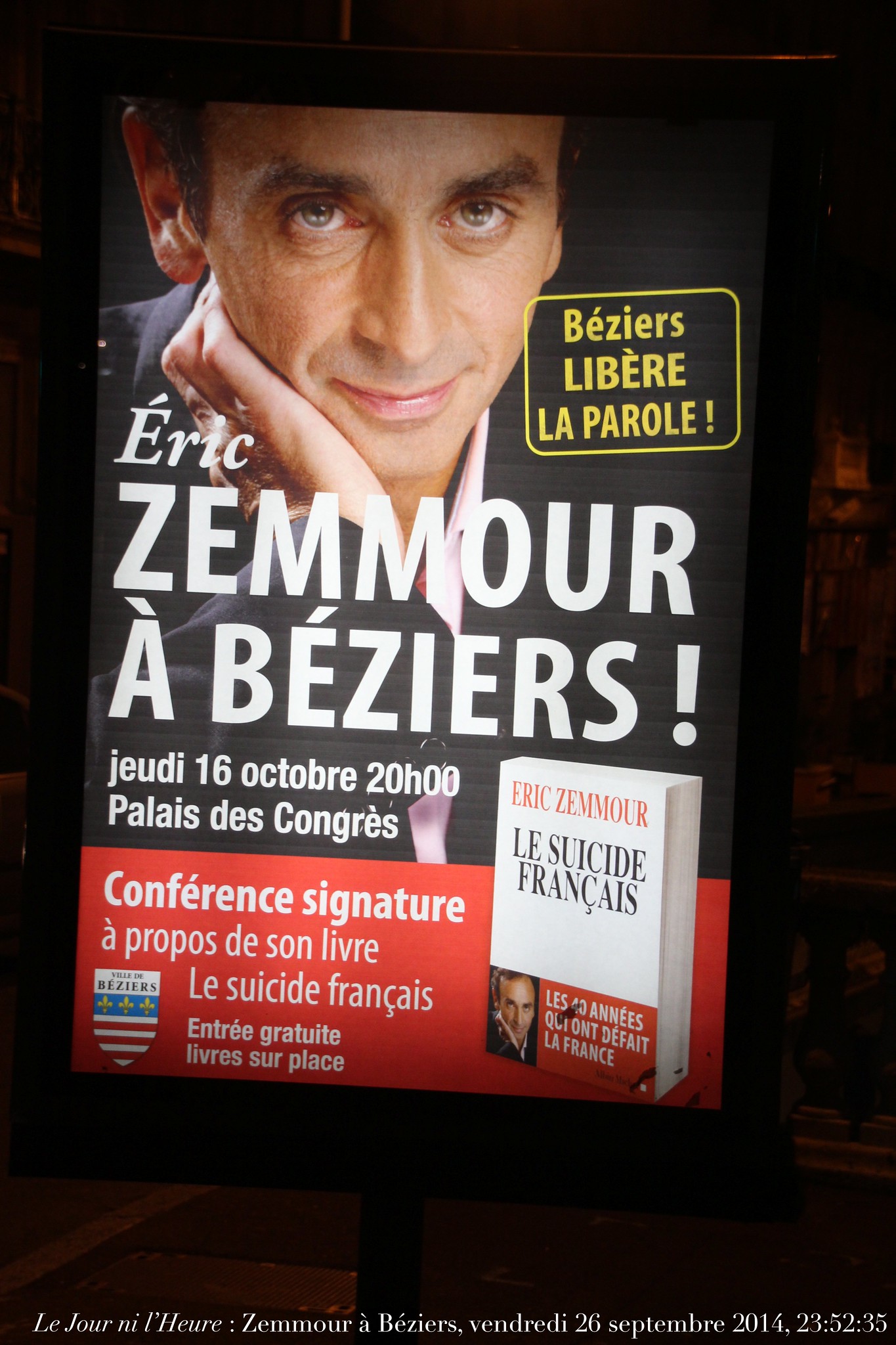
Poster for a conference Éric Zemmour held in 2014. (Renaud Camus, Flickr, CC BY 2.0)
In reality, opposition to mass immigration suddenly dominated this presidential campaign as the political writer and TV commentator Eric Zemmour set out to steal the issue away from Marine Le Pen and run with it all the way to the presidency.
Zemmour is a sort of anti-BHL, the very opposite of the rich “philosopher” Bernard Henri Lévy — both of Algerian Jewish origin.
In the Mitterrand 1980s, BHL won fame as leading anti-communist liberal leftist, castigating France for its latent fascism and anti-Semitism. If the U.S. and NATO can make a war in Afghanistan, Bosnia, Libya or Ukraine, he is all for it.
BHL is tall and means to be glamorous. Zemmour is small and mousy but speaks more reasonably than the flamboyant BHL.
In contrast to Bernard Henri Lévy’s moral lectures to the French, Zemmour has embraced his French homeland with ardent love and wishes to defend it from the perils of mass immigration and Islamist extremism. His initial rallies drew enthusiastic crowds, notably drawing many well-educated young men.
While Marine Le Pen appeals to the working class in small towns and rural areas, Zemmour won his followers among the educated upper class, calling for a “Reconquest” of France from the “great replacement” of the French by immigration.
Zemmour came in fourth with a little over 7 percent in the first round compared to Le Pen’s 23.15 percent. His ambition is to lead formation of a new right-wing party. He scored relatively well in the rich Western sections of Paris and came in first among overseas French living in Israel and other countries of the region.
It seems that Zemmour bit slightly into the upper income vote which finally went fairly solidly to Macron. The class division was clear in the final election — Macron got the votes of the prosperous, Marine was the favorite of the forgotten.
In the final election, Marine Le Pen swept France’s overseas territories in the West Indies, scoring 70 percent in Guadeloupe and 60 percent in Martinique and French Guyana. Since 93 percent of Guadeloupe’s population is of African origin, this vote seems to confirm that, whatever others may say or think, Marine Le Pen’s supporters do not consider her to be “racist.” [One of her most controversial positions, which Macron made much of during their debate, is to ban women covering their heads in public. Macron said it would start a “civil war.”]
Personality matters in politics. Just as Mélenchon’s popularity owes a lot to his irascible nature, Marine Le Pen’s popularity owes a lot to her public personality: a woman who appears warm, good humored and resilient.
Stop Fascism!
After first issuing the order, “Not one vote for Le Pen!” Mélenchon went on to exhort his first-round voters not to abstain, in effect endorsing Macron. The notion was that electing Le Pen would put an end to our freedoms once and for all.
Over 350 NGOs signed a statement by the Movement Against Racism and for Friendship among Peoples (MRAP) warning that her election would “abolish the state of law.”
Small groups of anarchist students temporarily occupied the Sorbonne and a couple of other elite universities in Paris and tore things up to show their discontent, a warning of what might come later.
The General Confederation of Labor (CGT) declared that: “History shows there is a difference of nature between republican parties that gain power and give it up and the extreme right which, once in power, confiscates it.”
And how would she do that? Her party is not very strong and entirely based on electoral politics. There is no militia organized to use force for political purposes (as in the case of real historic fascists). There are plenty of counter-powers in France, including political parties, hostile media, a largely left-leaning magistrature, the armed forces (linked to NATO), big business and finance which have never supported Le Pen, the entertainment industry, etc., etc.
In reality, the real danger of Marine Le Pen being elected was quite the opposite: the difficulty she would have had in governing. In her campaign, she made it clear she would want to share power, but with whom? Certain groups were promising to raise hell in the streets. Much of her proposed legislation would be impossible to enact or would face opposition in the courts.
The Hypothesis of Compromise
Let us just imagine a different context, where “left” is no longer defined by “absolute refusal to have anything to do with anyone on the right.”
Macron’s program for the next five years further speeds up the EU-sponsored neoliberal reforms, notably lengthening the age of retirement from 62, as it is now, to 65.
Mélenchon actually called for lowering retirement age to 60. Meanwhile, Marine Le Pen emphasized her support for retaining a lower retirement age, with special concern for all those who have worked in physically demanding jobs since an early age. This position helped her come in first with working-class voters.
In an imaginary different context, a Mélenchon could have proposed a compromise with Le Pen, in order to defeat Macron and carry out a somewhat more social program.
Since the two largely agreed on the crucial issue of foreign policy — in particular, avoiding war with Russia — it might be possible to work out some sort of “Gaullist” policy in common that would break the hold of the extreme center, with its unshakable loyalty to the Atlantic Alliance. This would not have led to “confiscation of power” but would shake things up. It would be reintroducing alternance into political life.
But in reality as it is, Mélenchon gave the election to Macron. And now he aspires to lead the opposition to Macron. But so do Marine Le Pen… and Eric Zemmour.
The Election & the War in Ukraine
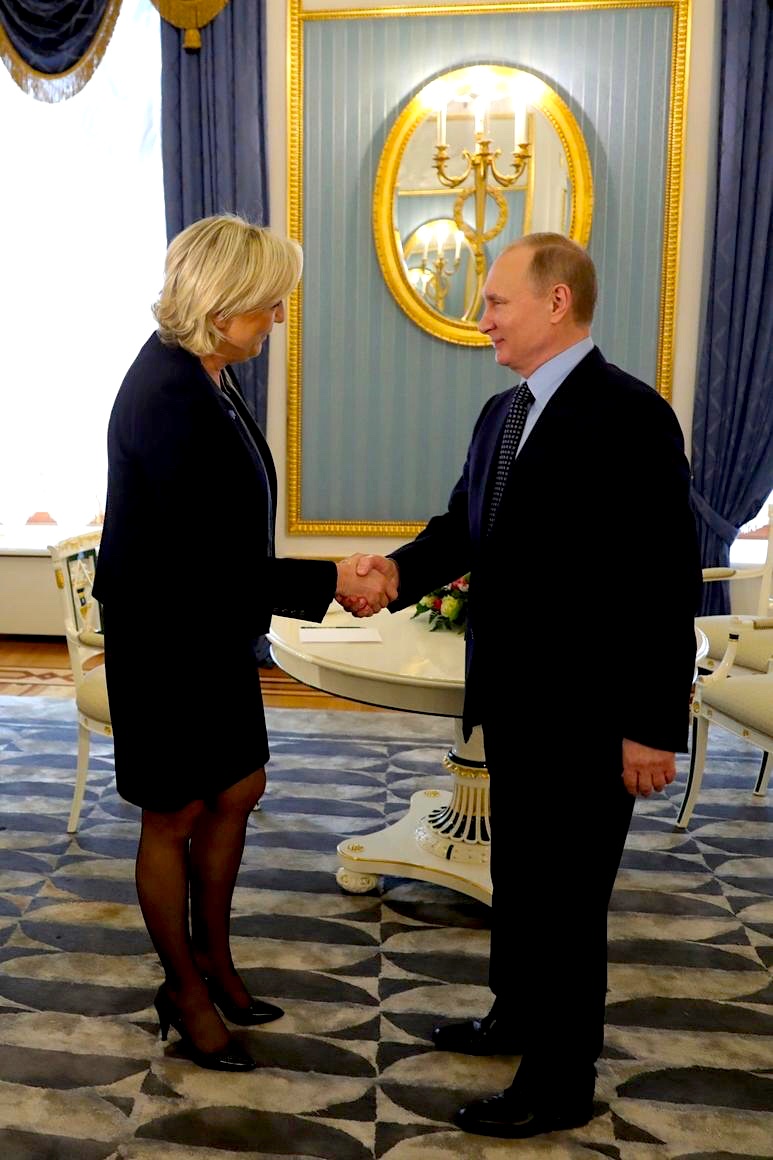
Marine Le Pen and Russian President Vladimir Putin in 2017. (Kremlin, Wikimedia Commons)
When Russian forces moved into Ukraine on Feb. 24, the prediction was that this would solidify Macron’s position as head of state in a military crisis. As media and politicians rushed to express solidarity with Ukraine against Russia, both Marine Le Pen and Jean-Luc Mélenchon were denounced for their well-known attitude toward improving relations with Russia. A photo of Marine Le Pen with Vladimir Putin was widely circulated by Green adversaries in the expectation that this would destroy her chances.
It didn’t happen that way. In fact, both those “Putin-understanders” saw their approval ratings rise as the war continued.
Moreover, Fabien Roussel, the rather fresh and young Communist Party candidate was edging toward a mild comeback for his party when the war began, but started to sink after he took the conventional Western anti-Russian pro-Ukrainian position.
The Green candidate Yannick Jadot, who had hoped to emulate the success of the German Greens, and Valérie Pécresse, candidate of the once powerful Republicans, both followed the official Western line on the war. Neither of them reached 5 percent.
In the first round, then, the war was not an issue — at least not at open issue, but it may have been a hidden issue, indicating that French voters are not as Russophobic as they are supposed to be.
However, in their three-hour televised debate on April 20, Macron took a low road to attack Le Pen.
Unlike Macron, whose campaigns can always count on generous donors, Marine Le Pen is chronically hard up for funding. In 2014, when no French bank would lend her money for the upcoming regional elections, she took out a loan of 9.4 million euros with the First Czech Russian Bank (FCRB). The bank has since failed, and she continues to pay its creditors. During their debate, Macron abruptly referred to that loan, which is public knowledge, telling Le Pen that “when you speak to Putin you are talking to your banker.” She reacted indignantly, stressing that she was a free woman.
Alexei Navalny followed up with a statement from his Russian prison in support of Macron. Three European prime ministers, Olaf Scholz of Germany, Pedro Sanchez of Spain and Antonio Costa of Portugal wrote an open letter opposing Marine Le Pen as “an extreme-right candidate who openly sides with those who attack our freedom and democracy, values based on the French ideas of Enlightenment.” European leaders naturally rushed to congratulate Macron for his victory as a commitment to European construction.
Marine Le Pen had insisted that the significant political division was no longer between left and right but between preservation of the nation and globalization. The drastic division of the world resulting from the Ukraine crisis is seen by some as ending the myth of globalization, and concern for the welfare of the nation is inevitably growing. Nevertheless, in this election globalization won over conservation of the nation.
The war was not a major issue in France largely because Macron himself is perhaps the least Russophobic among leaders of major European countries. His efforts to encourage Ukraine to negotiate the settlement of the Donbass problem according to the Minsk accords failed, but at least he made those efforts, or seemed to make those efforts. He appears to wish to salvage what he can of his position as potential negotiator, even as all prospects for negotiations are blocked by U.S. insistence on using the Ukraine crisis to defeat (and even destroy) Russia.
Government by Consultancy Firms
On March 17, the French Senate issued a report that revealed the profoundly technocratic nature of the Macron regime. In the last four years, the Macron government has paid at least 2.43 billion euros to international (largely American) consultancy firms to design policies or procedures in all fields, especially public health. For example, McKinsey consultancy charges the Ministry of Health 2,700 euros per day, a sum equal to the monthly salary for a public hospital employee.
This amounts to a form of very expensive privatization of the government. Even more serious, it means turning over the intellectual capacity of the French government to agencies adept in fashioning the uniform Western narrative in all matters. This is how technocratic “governance” destroys political government.
After his victory, Macron celebrated under the European flag. Marine Le Pen had called for a French foreign policy independent of the “Franco-German couple.” Macron promises to preserve the close partnership with Germany — even as tendencies in the two countries diverge more and more visibly. The prospects of an independent “Gaullist” French foreign policy remain remote.
Diana Johnstone was press secretary of the Green Group in the European Parliament from 1989 to 1996. In her latest book, Circle in the Darkness: Memoirs of a World Watcher (Clarity Press, 2020), she recounts key episodes in the transformation of the German Green Party from a peace to a war party. Her other books include Fools’ Crusade: Yugoslavia, NATO and Western Delusions (Pluto/Monthly Review) and in co-authorship with her father, Paul H. Johnstone, From MAD to Madness: Inside Pentagon Nuclear War Planning (Clarity Press). She can be reached at diana.johnstone@wanadoo.fr
The views expressed are solely those of the author and may or may not reflect those of Consortium News.

Late response. Johnstone’s Great-as-usual analysis!
This may sound naive to the experts, but any hope of a Greens-minus-Jadot compromise per this link below? Or (even) any joining of the Melenchon and LePen ‘pro-Putin’ factions? The daily grind of Russophobic MSM on this side of the Pond really demands some unified ‘Non’ to the EU/NATO lapdog role that Macron seems to have settled for….
hxxps://www.aljazeera.com/news/2022/5/2/french-greens-far-left-strike-deal-ahead-of-parliamentary-vote
excellent analysis, much better than those of the traditional french media
Very informative and thoughtful article by the ever insightful Diana Johnston.
Of great interest:
“ In the final election, Marine Le Pen swept France’s overseas territories in the West Indies, scoring 70 percent in Guadeloupe and 60 percent in Martinique and French Guyana. Since 93 percent of Guadeloupe’s population is of African origin, this vote seems to confirm that, whatever others may say or think, Marine Le Pen’s supporters do not consider her to be “racist.” ”
Idk if Le Pen could be any worse than a Rothschild banker scumbag. Sounds like he’s France’s version of Clinton, moving the party so far to the right, that the right party has to shift to an unpalatable extreme.
Neoliberalism leads to single party states and the collapse of real democracy.
Just as France is stuck with Macron, Canada is stuck with Trudeau.
People simply can’t contemplate the ruinous damage neoliberalism does to so-called democracies.
It is Sheldon Wolin’s “inverted totalitarianism”
I too agree this is an fairly good analysis, but I just don’t see the voting for Le Pen thing, it seems like a terrible idea. Mind you I’m not French but American, but I don’t see conditions in France could be so different from here that anybody could consider a right wing candidate to be anti-imperialist in any way, or against neoliberalism for that matter. I mean, we wouldn’t have neoliberalism if the right wing hadn’t introduced it, and since they hadn’t said anything about its negative effects in society until, oh, about 2016. The right using the left’s techniques and positions against them is nothing new — why should I think this time it’s different? Why should I suddenly think they are sincere? I haven’t heard a good argument yet.
Sames goes with imperialism. The right, particularly in France, has been the most rabid imperialists throughout history, that is a fact. Now they want to claim to be suddenly against it? How is that reasonable? Why would anyone take that as a realistic turn? It looks like a head fake, and a real lousy one at that. It reminds me of one of my coworkers, who is a Trump supporter. And back in maybe 2019 or so he claimed Trump was an anti-imperialist. Usually I listen to what he says respectfully, and when he said that I couldn’t help but spit out my coffee and laugh in his face. Trump an anti-imperialist? Tell that to the Venezuelans. Tell that to the Cubans. Tell it to the Bolivians, or the Iranians, or Chinese, or any of the other people living in economies which he tried to crush with sanctions. In short, I think believing in a right wing that is anti-imperialist is a simple delusion.
And then there’s the problem with what the right wing wants. Just listen to what they say, or write, or what laws they pass. Sure, I could support a right wing candidate if I don’t care about abortion rights, or really any other women’s rights; I must be fine with having Catholicism, or several other denominations, shoved down my throat; I must be fine with weakening voting rights, and with eliminating laws put in place to counter rampant discrimination. Oh and a fairly toxic variety of national chauvinism must be a-ok with me (and this domineering nationalism doesn’t lead to imperialism? Sure, uh huh).
In the end I see no basis to trust the right and any soothing sounds made about their search for power, and can’t see how it would be any different in France.
Thank you Diana Johnstone for your masterful and thorough explanation of recent French politics and of Macron’s recent victory.
Like others here, I’m disappointed in the German Greens as well for supporting the European war machine called “NATO,”
but back to France. Scare tactics work, and the “red scare” of Marine Le Pen against her was successful. I guess the French have short memories as do many of my fellow citizens in the US. Several years ago, the French working class were on strikes and demonstrations against Macron’s “austerity measures.” How soon they forgot!
Excellent analysis, but there’s one approximation: contrary to what has been written, a health employee earns far less than 2700 euros a months in France.
Thank you very much. This is the first piece I’ve seen that actually clarifies the positions of the various candidates in the French election. I’d been wondering why Le Pen was described as “populist.” Since she had the highest support from the working class, she was arguably the Left in that election.
1. That election shows, that the role of political parties having a clear program based on determined political ideology is declining and practically disappearing.
2. It shows, that the result of the election process depends essentially on propaganda campaigns depicting the adversaries as horrible communists or fascists, and promoting candidates without programs or even ideas. That is typically the case with Macron whose position is “ni droite, ni gauche”. That gives a fully open highway to opportunism and even adventurism.
3. Political battles do not depend on the will of the people, but on the control of the press and social media, owned by private pundits. The French case is typical of the manufacturing of consent described by Herman and Chomsky, and by others.
4. Propaganda is based on blatant and obviously lies, such as presenting Marine Le Pen as a fascist.
Nonetheless most of French voters are unable to understand, that they are purposely misinformed and deceived.
5. In fact France as a nation does not exist anymore. The majority of French people doesn’t support any more the Gaullist ideas of independence and sovereignty. That applies in particular to “Les républicains”, pretending to be de Gaulle’s heirs. What remains of France is only a government and a state, mere member of NATO and European Union, completely “loyal” – as the author said – to the United States, notwithstanding the catastrophic consequences of the US policy, in particular as regards the relationship between western Europe and Russia.
6. With regard to massive and mostly illegal immigration the population of today’s France has nothing to do with the population in the 50s or the 60s.
7. De Gaulle was supporting the idea of a “France éternelle “. Unfortunately that idea belongs to the past.
8. People who feel nostalgic about France, French traditions, French culture, French independence are not Fascists, just like Le Pen is not a fascist.
9. Macron said, that in France there is no French culture, but different cultures coexisting together, which appears to be true. Unfortunately.
10. Macron has been elected for 5 years, but after him political forces controlling the media will find another suitable candidate, i.e. a puppet which will be promoted just like Macron, practically unknown before 2017, and totally inexperienced, will be promoted and imposed upon the voters.
11. That election demonstrates the fall of the French spirit, the fall of democracy and the complete control of media ensuring the manufacturing of consent.
Excellent comment, thank you
excellent analysis, I am Belgian and I use to follow closely the French politics.IMHO its a disaster for France and unfortunately for Europe as well
The populist left MUST come up with a plan to protect the nation-state. It must address all forms of immigration (humanely restrict the borders). Absolutely nothing wrong with some isolationist nationalism that holds up civil liberties for all U.S. CITIZENS — African-Americans, Chicanos, Asian-Americans, Whites, and Native Americans.
A nation-state that protects its citizens’ economic livelihoods and DOES NOT search across the globe for military entanglements is a winning formula and a humane and realistic one.
A sensible position that, unfortunately, seems not to be represented in our politics.
All of Europe – not just France, going deaf, dumb and blind…
So far, only Hungary is trying to lead a semi-independent policy in regards to economy and international realtions, the rest are lost causes.
Obviously, things will have to get a lot worse before they can get better. The issue is whether we can ride this out, or whether there will indeed be an end of history via nuclear war or environmental collapse. We must learn to hate neoliberalism without hating neoliberals…or anyone else, for that matter. When will hatred in all its forms be called out like hatred of Blacks or Jews, etc.? Maybe that should be the core principle of the new party.
I do not agree that certain candidates are popular because of their personalities. Voters generally support candidates whose programs answer their needs.
Mélenchon and allies of the Union Populaire have clear programs in every major sector, programs which are coherent and which polls show are popular. Voters under the age of 35 voter more for Mélenchon than any other candidate in the first round.
Mélenchon was first in every French territory overseas except Mayotte in the first round. In the second round he recommended that no vote go to Le Pen. Curious that especially in the Antilles, that the voters gave Le Pen big majorites in spite of his recommendations. I think because Macron’s policies in the past five years were a disaster for the quality of life there.
I voted Mélenchon in the first round. I voted Macron in the second only because I consider Le Pen a terrible danger. Except for the danger I would have voted blank, since during Macron’s first 5 years, there were big cutbacks in health care and education, and a very important increase in poverty.
What “danger” from Le Pen? A slowdown of the slide into American neoliberalism? You sound thoroughly propagandized.
Funny you would call mistrust of the right being “propagandized.” Perhaps you don’t understand the centuries-long historical split between the left and the right. I’d recommend looking into it, you might learn something. It is real, in other words, and can’t simply be conjured away, particularly by screaming “you are PROPAGANDIZED!” at someone.
Personally I have been told what I *have to* believe by types like you. Nationalism GOOD, immigration, BAD, and much else. I don’t like what you’re offering, the deal is bad, and in complete honesty those of you trying to make a case for some so-called “left-right alliance” are doing an incredibly awful job of selling it. Actually, it isn’t much different than the Democrats: “you’d better take our lesser evil, and screw you for not liking it!”
If I were French I would’ve never voted for Le Pen either. I think those who think leftists should have a lot to learn before they could turn a single vote, but judging by reactions like this (the only kind I have ever seen), I won’t hold my breath waiting.
“What “danger” from Le Pen?”
Very good question which deserves a response.
Le Pen’s program requires that even the most legal immigrants have reduced access to services. For example native French citizens would have preferential access to public housing. Not that an immigrant would be denied a place, but would have to wait until no native French person wants a place that is still available. Immigraton from countries south of the Mediterranean would not be permitted. She is opposed to any increase in the minimum wage, saying that employers cannot afford it. This particular question is a bit complex, but one aspect is that worker productivity has increased a lot in recent years, but wages much less,
The slide int Americnn neolibarism started in 1983 under Mitterrand, after threats from US and UK business interests. Macron has been a major part of this trend of course, but Le Pen recently has become soft on this question and has accepted staying in the European Union and obeying its harsh economic rules. To top it off she proposed a referendum in France to reinstate the death penalty.
Of course, Macron is indeed a proponent of American neoliberalism, terrible for the well being of us all. He personally is a person who is comfortable only in the company of the super rich. So I can understand someone who would never vote for Macron.
I agree with Sam.
Tnx Ms Johnstone, CN… (& commenters).
Only Le Pen policy stated specifically above: Prohibition of women’s headcoverings.
While piece does not state “women only” certainly implied thru context.
Hardly feminist; ironic coming from a woman candidate… (IMO).
So you were taken in by the ploys Diana mentioned. I am a real leftist voter and have lived in France for twenty years. I support Mélenchon but have found the five years of Macron, with the Yellow Vests, and their forlorn hopes for help, treated like criminals, completely unable to care for the majority, while Marine Le Pen obviously does.
I find it ironic that the fear of “far right” Le Pen seems to have disappeared from the French, like most other EU élite members, who unflinchingly support the real fascistic government of Ukraine, treated as if it bore any resemblance to freedom, independence or democracy. Marine Le Pen’s “sovereignist” stand is for France to be independent and for the working people.
A nice summation of France’s politics, or perhaps it’s inexorable slide into US-style neoliberalism. Hopefully Macron understands how dangerous the situation in Ukraine really is.
Macron is the creature of a media baron named Vincent Bolloré. Macron has hardly blinked at Bolloré’s takeover of radio stations like Europe1 or magazine’s like Paris-Match (not to forget Canal+and publishing giant Hachette) The so called “rematch” leaves many wondering just how the unelectable Marine got into the second round. (there are persistent rumors of voter fraud) One thing is certain: the percentage of those opposed to Macron runs at around 70% and according to polls the French wish a return to “co-habitation” or a president of one political color and a government from another. Mélenchon could get his wish or the country could become ungovernable.
“Bellicose” German Greens. Love it. They really have embraced in their weird NATO support the antithesis of global green politics. I’m a Green Party member from Aotearoa NZ and we have almost nothing in common with tbe german party. How on earth did they get that way?
As a Green from Massachusetts, I wonder the same thing about the German Greens. Winning elections is nice, but if it’s at the expense of your basic principles, what’s the point?
Langley’s cash makes many a cheap harlot.
From the outside, this can be seen either as showing that Macron is a popular president and/or that France has once against been saved from the fascist threat. Neither of these impressions is correct. Mostly, it signifies that France is stuck in There Is No Alternative (TINA) – the neoliberal replacement of political experimentation by expertise governance.